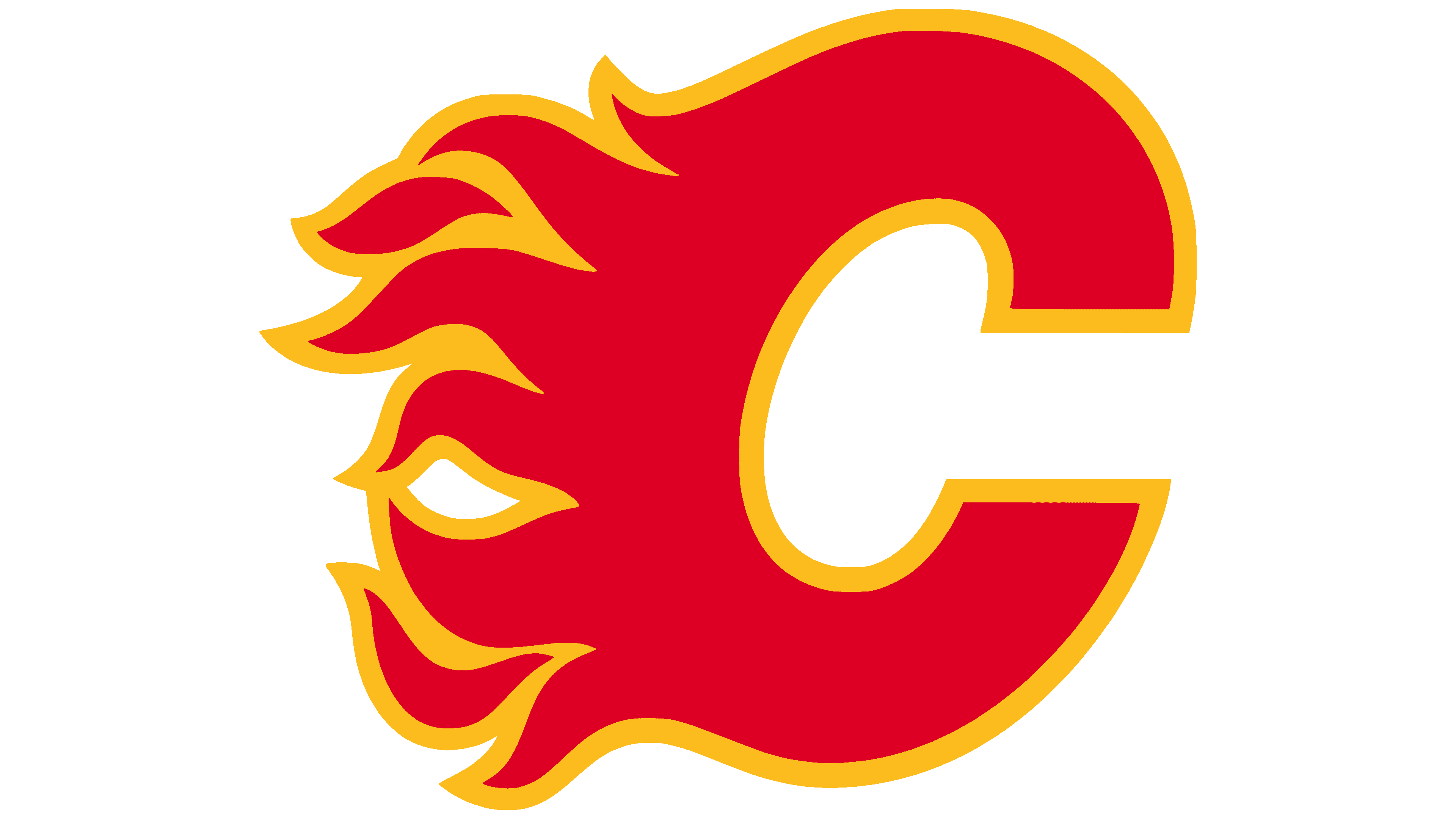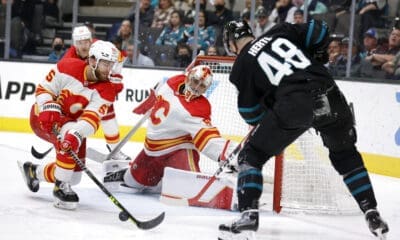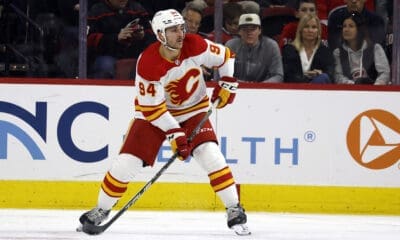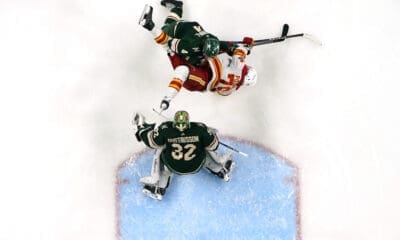Calgary Flames
The Flames should not sign Mark Jankowski
We've seen four years. We don't need to see anymore.

Do you remember throwing your remote at the television and yelling “WHO?” at the top of your lungs the moment the Flames selected Mark Jankowski in 2012? Here, why not relive that moment?
Make sure to listen to the analysts dance around words like "why" and "terrible" and instead do everything they can to avoid insulting Jay Feaster. They name who his uncles are before they get to talking about his hockey skills.
Do you remember watching players the Flames could’ve picked achieve NHL success? Tomas Hertl is just about to hit 100 points for his career. Olli Maatta is pretty good. Teuvo Teravainen is fun to watch. Malcolm Subban could be answering our goalie problems right now (not really, but it’s fun to imagine).
We were able to stick this in the back of our heads for four years. The benefit of drafting Jankowski is that we could wait and see what he would become with no NHL impact. Built into that ten year plan was a four year waiting period of obligation-free optimism. Maybe Jay Feaster was onto something! He also found Johnny Gaudreau and Jon Gilles, maybe he knows a thing or two about NCAA prospects.
It's been four years, and the answer is no. Mark Jankowski was a mistake, and a high cost one at that. But the Flames have a chance at somewhat recouping that cost. If they don't sign him by August 15th, they will be awarded a 2017 second round pick (#51 overall). If Jankowski isn't worth that pick, they should just let him walk. He is not worth that pick.
There is very little evidence to suggest that he is anything other than a bottom six centre. He only finally cracked the point-per-game plateau this season, but by a very thin margin. This is also his senior season, mind you. Seniors generally reach a point-per-game because they get the most ice time and are more experienced than at least half of the players they come up against. Dominant college players, who will likely become great NHL players, hit that point-per-game mark way earlier than their senior season.
In fact, hitting a point-per-game is a very baseline measure for college forwards. Lee Stempniak hit that mark in his second year, as did Andrew Cogliano. Joe Colborne hit that mark in his second year of college. Joe Colborne. If Mark Jankowski couldn’t outperform Joe Colborne in college, his fate is written.
But why stop there? Kenny Agostino (2nd year), Mason Raymond (2nd year), Drew Stafford (3rd year), Chris Higgins (1st year), Mark Arcobello (3rd year), Erik Condra (2nd year), Brian Boyle (3rd year), Paul Stastny (1st year), Jaden Schwartz (1st year), I could go on. The basic idea is that scoring at a point-per-game rate at the NCAA level isn’t uncommon among guys who make the NHL. These players reached that mark earlier (some going way over one PPG) than Mark Jankowski.
Granted, there are holes in this evidence. There are plenty of players who didn't reach that PPG mark and have NHL careers, and vice versa. You could argue team, conference, position (all are forwards, not all are centres), and era factor in. That's fair.
Instead, we'll turn to NHLe, a stat I particularly favour. Based on historical trends, most major leagues in the world (especially those that send players into the NHL) are set to the NHL's standard. For example, the NHLe translation factor for the KHL is 0.83, basically saying that a point scored in the KHL is 83% as easy as a point scored in the NHL.
By setting production in other leagues to the standard of the NHL, we can more easily make projections. The difference between 1.0 QMJHL PPG (NHLe of 22.96) and 1.0 NCAA PPG (NHLe 32.8) is now quantifiable, and we can make our projections more accurately. The QMJHL player will not have as good a career as the NCAA player, as he plays in an easier league.
Age also factors in here. The older a player gets, especially in junior leagues, the more likely they will rack up points (as we noted above). A player with a 40 NHLe in his draft year (names such as Steven Stamkos, John Tavares, Tyler Seguin pop up) is significantly better than someone in their draft +2 year (a whole bunch of folks who never amounted to anything). Keep all this in mind while we look at Jankowski’s NHLe.
| Jankowski | Comparables | |
| D+1 | 16.01 | Tuevo Teravainen, Petr Vrana, Mike Winther, Maxime Tanguay, Derek Krestanovich, Roman Horak, Martin Latal, Graham Black, Luke Walker, Levi Nelson, Max McCormick, Taylor Matson, Stephen Johnston, Jonathan Lehun, Christian Isackson |
| D+2 | 19.45 | Mattias Tedenby, Petr Vrana, Mike Winther, Alexander Guptill, Luke Walker, Randy Cameron, Levi Nelson, Max McCormick, Mitch Callahan, Nic Dowd, Marco Rosa |
| D+3 | 22.14 | N/A |
| D+4 | 31.94 | N/A |
His comparables in the first year is terrible. While Teravainen is a surprise (even for myself), he is one out of 15. That's a 6% success rate. When you jump to the next year, 0/11 have had any NHL success. A lot of these guys went back to university after Major-Junior. There were very few useful comparisons beyond the second year. These are warning signs.
The historical data doesn't favour Jankowski at all. His chances of success lie heavily in the AHL, and there's plenty of guys readily available to be fringe NHL players.
And if you just don't trust numbers, here's the eye test for you:
Edit: Jankowski was extremely ill in last night's game that apparently required a hospital trip and several IV bags according to Wes Gilbertson. Lambert's criticism of his usage in OT is unfair in light of this, but he may also be trying to say that this is a general trend regardless of whether or not Jankowski is injured. He has not clarified further.
in last two games, PC played 72:27 of OT. mark jankowski on for just 13 minutes of that. coaches don’t trust him in high-leverage situations
— yung intelligence (@twolinepass) March 25, 2016
reality: jankowski is a third-liner who gets put in a position to score plenty of points with PP time galore and heavy O-zone deployment.
— yung intelligence (@twolinepass) March 25, 2016
Lambert is widely renowned for his snark and his negativity, but he sees a whole lot of Jankowski. He's tracked him since he joined Providence. There are very few who will tell you otherwise (Ryan just tells it the best).
And there rests the case against Jankowski as a player. He's not very good, and if he is simply under-performing, it's concerning considering that he has been underperforming through four years at college. The Flames have many centres in the organization who are much better than Jankowski is. If you look at his performances, look at his projections, looking at his play, you'll see a player that has very little to offer besides a compensatory pick.
by xx xx








